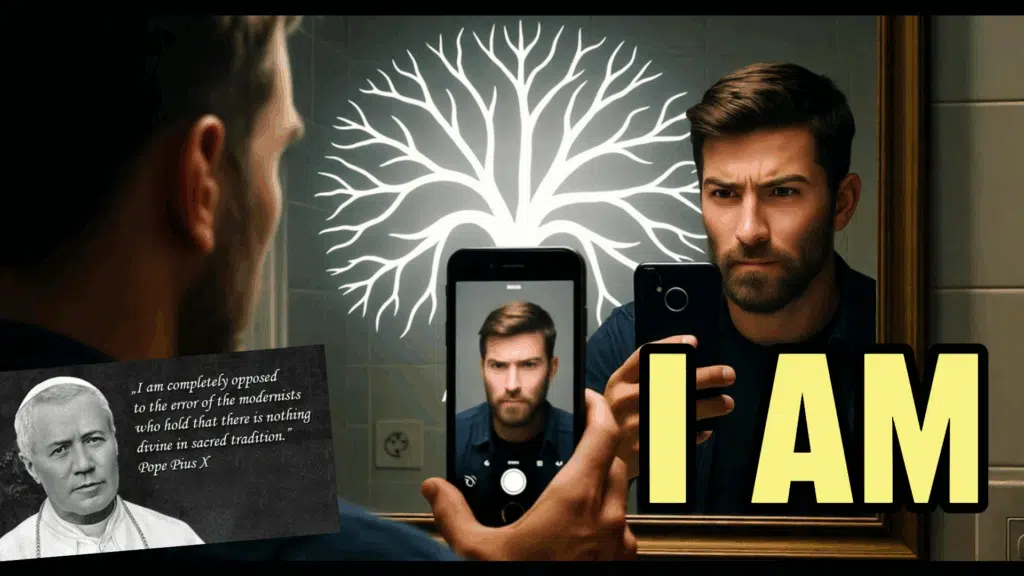
Pius X vs The Future Church: Modernism and the Making of the New Gospel
There’s a reason the modern world talks so much about “energy,” “vibrations,” and “the universe.” Once a man denies the God who made him–along with all that “energy,” “vibration,” and “universe” he pretends to believe in–he doesn’t stop worshipping. He just turns the bathroom mirror into an altar, the selfie into a sacrament.
Mankind no longer looks up to heaven, to something higher. We try instead to drag heaven down–reshape it, rebrand it, rationalize it–in the spirit of “Enlightenment” thinking, and call it progress.
My students often asked how, in Fahrenheit 451, the firemen went from extinguishers to arsonists without anyone noticing. Many adults scoff at such fiction, saying that could never happen in real life.
Well.
The Modernists of Pope Pius X’s time–at the turn of the 20th century and mere decades before Pius XII, John XXIII, and the Second Vatican Council–were not content merely to doubt God’s existence. They sought to redefine where God resides–and what he even is. In doing so, they built a religion that looks suspiciously like a nervous system, where faith is reduced to feeling and revelation is nothing more than an emotional ripple within the subconscious–a fuzzy little tingle in our tummies that feels real, so it must be true.
It’s not that they stopped believing in God–or even wanted us to. It’s that they decided they were him–and we could be too.
Sound familiar?
“Yeah, but that could never happen to me. I’d never fall for that trick.”
“How could Adam and Eve be so stupid?”
Well.
RELATED
When Pope Pius X Saw the Future: PASCENDI and the Modern Psyop
Pixels, Psyops, & Digital Prisons—And the Sacramental Cure
THAT ‘MYSTERIOUS FORCE’: Secret Society, Secret Plan, Public Popes
When Pius X, in his landmark encyclical Pascendi, begins diagnosing Modernism’s philosophy, he doesn’t mince words:
Modernists place the foundation of religious philosophy in that doctrine which is usually called Agnosticism. According to this teaching human reason is confined entirely within the field of phenomena, that is to say, to things that are perceptible to the senses, and in the manner in which they are perceptible; it has no right and no power to transgress these limits. Hence it is incapable of lifting itself up to God, and of recognising His existence, even by means of visible things.
That is, man no longer ascends toward God–he stares into the mirror or turns the phone in upon himself and calls it Christianity.
“I don’t believe there’s just one Church.”
Because it’s how I feel.
Yet the Vatican Council [the First, in the 1800s, not the Second, which occurred after Pius X in the 1960s] has defined, “If anyone says that the one true God, our Creator and Lord, cannot be known with certainty by the natural light of human reason by means of the things that are made, let him be anathema” (De Revel., can. I); and also: “If anyone says that it is not possible or not expedient that man be taught, through the medium of divine revelation, about God and the worship to be paid Him, let him be anathema” (Ibid., can. 2); and finally, “If anyone says that divine revelation cannot be made credible by external signs, and that therefore men should be drawn to the faith only by their personal internal experience or by private inspiration, let him be anathema” (De Fide, can. 3).
With Modernism, our living perception of the tangible, physical world creates our religion. But what happens when perception replaces truth? When the mind no longer rises to meet God, but bends him to fit our lens?
The result is something we all understand: If all of our friends are of different sects inside “Christianity,” not to mention other non-Christian beliefs, and because we have fond feelings for them and they’re all so nice at Christmas parties, we cannot conceive of a God that would punish any one of them, and thus the creation of universal salvation is attained.
From there we have no consequences in life.
Now take a look at our world. If everything is ok, then nothing matters. Nothing. And we wonder why it is the way it is? We pontificate for law and order, but reject the God and the Church that provides it?
I confess it: I helped to create this entire nightmarish deception, specifically because I lived much of my life as a Modernist and didn’t even realize it.
From this “Agnosticism,” Pius X warns, “it is inferred that God can never be the direct object of science…. [W]ithin their boundaries there is room for nothing but phenomena; God and all that is divine are utterly excluded.” In other words, once we deny that reason can lift itself toward God, the supernatural is not only dismissed–it is pathologized.
This point is made well in the pull quote above–the first two points not bolded–from the First Vatican Council teachings.
Look at the Christian martyrs we claim to honor. All of them were pathologized by the mob and their killers. Even St Paul, when he was still Saul, was falling for the deception.
Yet their blood is the bed on which Christianity and the spread of Christian civilization is based.
If St Paul warns against such deceptions, shouldn’t we take a long, hard look at the automatic assumptions we’ve created for ourselves? Are we in fact creating a god to our own comforts and liking, just because everyone on Facebook agrees with us?
Again, guilty.
How, Pius X asks then, do these self-proclaimed agnostics make the leap “from Agnosticism, which is a state of pure nescience [not knowing], to scientific and historic Atheism, which is a doctrine of positive denial [knowing]”? His question slices through every Modernist illusion:
How does ignorance become certainty?
…and consequently, by what legitimate process of reasoning, starting from ignorance as to whether God has in fact intervened in the history of the human race or not, they proceed, in their explanation of this history, to ignore God altogether, as if He really had not intervened…. Yet it is a fixed and established principle among them that both science and history must be atheistic: and within their boundaries there is room for nothing but phenomena; God and all that is divine are utterly excluded.
You can almost hear him speaking to 2025, to post-9-11 America, to the age of artificial “intelligence.” Our atheism–an automatic result of Modernism’s polytheism (everything’s cool man! you do you!)–is algorithmic now, inside all the socials, burning through our eyes and coursing through our very veins. We do not deny God in words. Nah, we love a good meme or isolated Bible quote.
But in accepting it all, we are denying his singularity, his Person, his realness. We are deleting him in code.
This is not accidental, Pius warns.
Agnosticism is only the negative part of the system of the Modernist: the positive side of it consists in what they call vital immanence. This is how they advance from one to the other. Religion, whether natural or supernatural, must, like every other fact, admit of some explanation. But when Natural theology has been destroyed, the road to revelation closed through the rejection of the arguments of credibility, and all external revelation absolutely denied, it is clear that this explanation will be sought in vain outside man himself. It must, therefore, be looked for in man; and since religion is a form of life, the explanation must certainly be found in the life of man. Hence the principle of religious immanence is formulated.
God inside man.
It’s not altogether untrue, of course–but it cannot stand alone. Once severed from his unique, historical Person, the mirror and the cell phone become apt metaphors. It is the only sentiment–the only phenomenon–left. Having destroyed revelation from without, Modernism rebuilds it from within–using emotion as its foundation. “I feel it, so it must be true.” “I had a gut instinct.”
“You do you, man.”
It is the spirit of Antichrist, of Lucifer, of the serpent in the Garden–we are making ourselves little gods, and don’t even realize it.
Modernism has turned us away from ad orientum and toward the self, a shift inward. This is one reason the 1969 change in the Mass is so pivotal. What we find in the self is not God, but sentiment, but we still call it God. Pius explains:
[T]he first actuation … of every vital phenomenon, and religion … is due to a certain necessity or impulsion; but it has its origin, speaking more particularly of life, in a movement of the heart, which movement is called a sentiment. Therefore, since God is the object of religion, we must conclude that faith, which is the basis and the foundation of all religion, consists in a sentiment which originates from a need of the divine. This need of the divine, which is experienced only in special and favourable circumstances, cannot, of itself, appertain to the domain of consciousness; it is at first latent within the consciousness, or, to borrow a term from modern philosophy, in the subconsciousness, where also its roots lies hidden and undetected.
In other words, mankind creates the God it needs either in a particular time in history or right here and now for the personal self, according to some latent desire or need.
It is what creates the objection, “I don’t get anything out of Mass.”
Me me me.
Can you see where this is a problem? Can you see where the feels can so easily cloud our judgment, our understanding of God’s voice, our understanding of the exclusivity of holy religion?
Faith has been psychologized, just like anything you might see from Freud–a serpentine enemy to Christianity. Precept, teaching, law, and obedience to human need for holy structure has been replaced with feeling, with fond sentiments. “Never forget…” “Revival…”
Christianity driven by a pagan form of nationalism.
Hence … springs that ridiculous proposition of the Modernists, that every religion, according to the different aspect under which it is viewed, must be considered as both natural and supernatural. Hence it is that they make consciousness and revelation synonymous. Hence the law, according to which religious consciousness is given as the universal rule, to be put on an equal footing with revelation, and to which all must submit, even the supreme authority of the Church, whether in its teaching capacity, or in that of legislator in the province of sacred liturgy or discipline.
It is emotion, feeling, and sentiment to which Modernists give the name of faith, “and this it is which they consider the beginning of religion” (Pascendi). It is the theology of psycho-self-help books, the prototype for Christian YouTube influencers, for those who confuse divine revelation with the dopamine hit of a hundred likes on a post.
The supernatural has been destroyed. The understanding of God’s kingdom as being hierarchical and ordered has been destroyed.
And therefore God, in the hearts of men and society has been…
God is no longer a person. God is no longer someone who speaks, someone who directs, someone who suffers, someone who dies–for us.
He becomes–has become–something one feels.
That is Modernism. That is the seed of our present sickness. That is why Pius X was sounding the alarum.
We scroll endlessly through emotional content, like the latest government-media psyop disguised as revelation, mistaking sentiment and a list of agreeable voices in the comment section for the voice of God. The feed has become our catechism, what we believe, what we know to be true, what it is to have faith in God.
The self and how we feel has become our sacrament.
So the question for the non-Modernist who believes in objective truth, someone who is becoming fewer and fewer in number, turns to this: Where is Truth exactly, if every man’s feeling becomes his god?
Where is revelation if every emotion claims to be divine?
How many different Jesus Christs exactly are there out there?
Pius X’s words ring louder now than ever, and I assure you this is not just a Catholic vs Protestant thing. If you’ve followed my work you know what I have been trying to get at:
“They make consciousness and revelation synonymous.”
I am–God.
And that is the hinge of the modern deception.
Just as it was in the Garden of Eden.
Once consciousness becomes revelation, there is no need for Christ–only a need for content enough of “our people” agree with. And if you don’t join the roar of this alleged new revival, this sweeping new “Christianity,” let you be anathema.
FURTHER READING
TEST THE SPIRITS: Christ and the Trial of Rampant Memetic Energy
From Psyops to Reality: Why the Sacramental Life Endures



